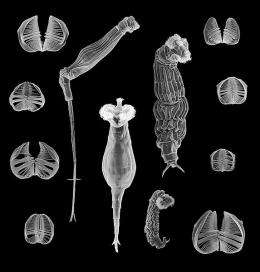DNA 'ingesting': A tenth of quirky creature's active genes are foreign

Up to ten per cent of the active genes of an organism that has survived 80 million years without sex are foreign, a new study from the University of Cambridge and Imperial College London reveals. The asexual organism, the bdelloid rotifer, has acquired a tenth of its active genes from bacteria and other simple organisms like fungi and algae. The findings were reported today in the journal PLoS Genetics.
Bdelloid rotifers are best known for going 80 million years without sex, as they have evolved to reproduce successfully without males. Many asexual creatures go extinct without the benefit of traditional genetic evolution. However, bdelloids have flourished by developing ingenious ways of overcoming the limitations of being asexual.
Bdelloids have also developed the fascinating ability to withstand almost complete desiccation when the freshwater pools they typically live in dry up. They can survive in the dry state for many years only to revive with no ill effect once water becomes available again.
"We were thrilled when we discovered that nearly ten per cent of bdelloids' active genes are foreign, adding to the weirdness of an already odd little creature," said Professor Alan Tunnacliffe, lead author of the study from the University of Cambridge. "We don't know how the gene transfer occurs, but it almost certainly involves ingesting DNA in organic debris, which their environments are full of. Bdelloids will eat anything smaller than their heads!"
Because some of the foreign genes are activated when the bdelloids begin to dry out, the researchers believe that the genes play a role in bdelloids' ability to survive desiccation.
Professor Tunnacliffe added: "Other researchers have shown that bdelloids contain powerful antioxidants, which help protect them from the toxic oxidising agents that are the by-products of desiccation. These antioxidants have not yet been identified, but we think that some of them result from foreign genes."
For the study, the researchers extracted all of the messenger RNA (genetic code similar to DNA which provides a blueprint for the creation of proteins) from bdelloid rotifers and sequenced each message, creating a library of the animal's active coding information. Using a supercomputer, they then compared these messages with all other known sequences and found that in many cases similar sequences had been found in other organisms.
Strangely, however, these other organisms were often not animals, but simple microbes. This means that bdelloids have genes that are not present in other animals, but have been acquired from micro-organisms and adapted for use in the rotifer.
More information: The paper 'Biochemical diversification through foreign gene expression in bdelloid rotifers' will be published in the 15 November edition of PLoS Genetics.
Journal information: PLoS Genetics
Provided by University of Cambridge


















